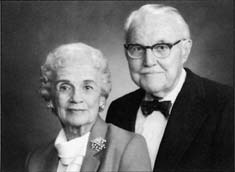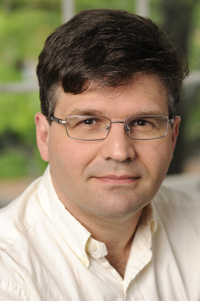 Baltimore native EDWARD J. SCHAEFER graduated from The Johns Hopkins University in 1923 with a bachelor’s degree in electrical engineering. He joined General Electric after completing his undergraduate studies. In 1944, he and a partner founded the Franklin Electric Company, a manufacturer of submersibles, motors, and packaging and weighing equipment. Under his leadership as chief executive officer and chairman, the firm in Bluffton, Indiana, expanded to include four plants in the U.S. and three overseas. Today, Franklin Electric has grown into a multi-million-dollar global provider of complete water systems and fueling systems. The company now has 14 manufacturing and distribution facilities worldwide.
Baltimore native EDWARD J. SCHAEFER graduated from The Johns Hopkins University in 1923 with a bachelor’s degree in electrical engineering. He joined General Electric after completing his undergraduate studies. In 1944, he and a partner founded the Franklin Electric Company, a manufacturer of submersibles, motors, and packaging and weighing equipment. Under his leadership as chief executive officer and chairman, the firm in Bluffton, Indiana, expanded to include four plants in the U.S. and three overseas. Today, Franklin Electric has grown into a multi-million-dollar global provider of complete water systems and fueling systems. The company now has 14 manufacturing and distribution facilities worldwide.
During his lifetime, Mr. Schaefer was a fellow of the American Institute of Electrical Engineers and held 80 U.S. patents. He served a term on The Johns Hopkins University Board of Trustees and was honored in 1978 with the university’s Distinguished Alumnus Award. Mr. Schaefer played a key role in the establishment of the Whiting School of Engineering as a member of the six-person ad hoc committee, chaired by Willard Hackerman, Engr 1938, that, in 1977, recommended and orchestrated the opening of a separate school of engineering.
Mr. Schaefer continued to work full time until his death in 1991 at the age of 90. He was predeceased by his wife of 59 years, HILDEGARDE SCHAEFER, who died in 1987. The Edward J. Schaefer Professorship in Electrical Engineering is one of two endowed professorships generously provided to the Whiting School by Mr. and Mrs. Schaefer to support the engineering faculty.
Held by Pablo Iglesias
 A native of Caracas, Venezuela, PABLO IGLESIAS, the Edward J. Schaefer Professor of Electrical Engineering, received his bachelor of applied science degree in engineering science from the University of Toronto in 1987 and his PhD in control engineering from the University of Cambridge in 1991. He then joined the faculty of The Johns Hopkins University, where he is currently a professor in the Department of Electrical and Computer Engineering, with joint appointments in Biomedical Engineering and Applied Mathematics and Statistics. He also has had visiting appointments at the Lund University, Weizmann Institute of Science, California Institute of Technology, and Johns Hopkins School of Medicine. During the 2012-13 academic year, he will be on sabbatical at the Max Planck Institute for the Physics of Complex Systems in Dresden, Germany.
A native of Caracas, Venezuela, PABLO IGLESIAS, the Edward J. Schaefer Professor of Electrical Engineering, received his bachelor of applied science degree in engineering science from the University of Toronto in 1987 and his PhD in control engineering from the University of Cambridge in 1991. He then joined the faculty of The Johns Hopkins University, where he is currently a professor in the Department of Electrical and Computer Engineering, with joint appointments in Biomedical Engineering and Applied Mathematics and Statistics. He also has had visiting appointments at the Lund University, Weizmann Institute of Science, California Institute of Technology, and Johns Hopkins School of Medicine. During the 2012-13 academic year, he will be on sabbatical at the Max Planck Institute for the Physics of Complex Systems in Dresden, Germany.
Dr. Iglesias has written more than 100 research articles and two books: Minimum Entropy Control for Time-Varying Systems (Birkhäuser) and Control Theory and Systems Biology (MIT Press). He has received numerous awards and honors for research and teaching, including the Journal of Imaging Technology’s Charles E. Ives Best Paper Award and the George E. Owen Teaching Award presented by the JHU Student Government Association. He was also named a Distinguished Lecturer by the Institute of Electrical and Electronics Engineers Control Systems Society.
Dr. Iglesias’ research focuses on the use of control and information theory to study biological signal transduction pathways. He is working to understand how cells interpret directional cues to guide cell motion, the regulatory mechanisms that control cell division, and the sensing and actuation that enable cells to maintain lipid homeostasis.
 Baltimore native EDWARD J. SCHAEFER graduated from The Johns Hopkins University in 1923 with a bachelor’s degree in electrical engineering. He joined General Electric after completing his undergraduate studies. In 1944, he and a partner founded the Franklin Electric Company, a manufacturer of submersibles, motors, and packaging and weighing equipment. Under his leadership as chief executive officer and chairman, the firm in Bluffton, Indiana, expanded to include four plants in the U.S. and three overseas. Today, Franklin Electric has grown into a multi-million-dollar global provider of complete water systems and fueling systems. The company now has 14 manufacturing and distribution facilities worldwide.
Baltimore native EDWARD J. SCHAEFER graduated from The Johns Hopkins University in 1923 with a bachelor’s degree in electrical engineering. He joined General Electric after completing his undergraduate studies. In 1944, he and a partner founded the Franklin Electric Company, a manufacturer of submersibles, motors, and packaging and weighing equipment. Under his leadership as chief executive officer and chairman, the firm in Bluffton, Indiana, expanded to include four plants in the U.S. and three overseas. Today, Franklin Electric has grown into a multi-million-dollar global provider of complete water systems and fueling systems. The company now has 14 manufacturing and distribution facilities worldwide.